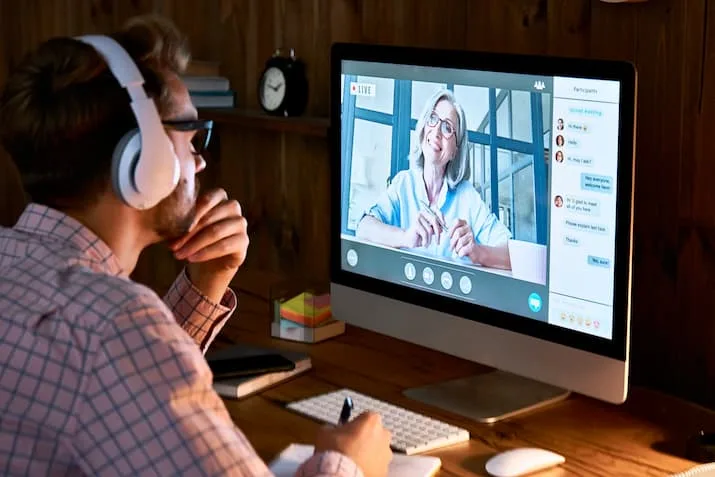Help! I'm having second thoughts about my course
By Open Universities Australia
What happens if you make it a few weeks into your uni course and it isn’t what you expected? There’s still time to switch directions. Here’s what to do if you feel like this while studying through Open Universities Australia.
Ask us for advice
Hey, guess what? You’re human, and as a human, you’re allowed to change your mind. It takes a certain level of self-awareness to realise something isn’t right for you, and even more guts to do something about it.
If you’re second guessing your course, your best first step is to chat with an Open Universities Australia student advisor about what you’re feeling. They’ll listen to your concerns and help you understand your options (which we’ll go into below).
If you’re having doubts about your chosen career direction, or something unexpected has happened in your personal life, they can also direct you to an appropriate support service at your university, whether that’s a peer mentor program, career counsellor or mental health counsellor. You don’t have to figure this out alone.
Reduce your study load
Before you make any big decisions, it’s worth asking yourself if you’re unhappy with what you’re learning—or the time you’re committing to study.
Because it’s very common to get a shock when you first start university and find out what the workload entails. Especially if you’re juggling study with other obligations, like work and childcare.
If the time commitment is your biggest concern, you can readjust the number of subjects you’re taking at once (what we call your “study load”). Instead of taking two subjects this term, drop one for now and let yourself get used to studying a single subject.
You have until the census date to withdraw from a subject without any financial or academic consequences. Contact our student advisors to change your study load.
Find a tutor to coach you
We chat to a lot of students who are still enthusiastic about their study area, but lack confidence in their own abilities after classes start. Because they’re the first person in their family to study at uni, or they haven’t studied for a long time, or they were told by a teacher once that they aren’t suited to a subject… the list of reasons (sadly) goes on and on.
That nagging little voice of self-doubt in the back of your head is called imposter syndrome. And it's dead wrong.
If you still want to do this, but you’re feeling overwhelmed after reading your course outline or participating in a few online discussions, we recommend seeking out a tutor. Since most tutors are former or current students, they’ve been exactly where you are and can give you the one-on-one support you need to make sense of your lessons and develop more effective study habits.
Email your course’s teaching staff or visit your university’s website to find out if there’s a free tutoring program available to online students through your uni. Or you can read our advice on how to choose the right tutoring service.
Switch to a different subject or degree
If you’re positive that you’re just not feeling your first (or second, or third) subject, there’s nothing wrong with that! You can withdraw and switch to something that suits you better. You should contact a student advisor before the census date for advice about how to do this.
While we’ll have to take things like subject availability and entry requirements into consideration, you’re free to switch for any reason—for example, maybe you want to start with a more introductory topic, or try a unit with fewer essays while you build up your academic writing skills.
Just remember if you’re enrolled in a qualification, there are certain compulsory subjects you’re required to complete to graduate from your course. You may be able to put these off until you’re ready in a later study period. If you feel the issue is bigger than that and you’d prefer to change into a different degree altogether, please get in touch with us before the census date.
Transferring to a new qualification will generally require submitting a new application and waiting for the next available intake date, but provided you meet the entry requirements, it can be done.
Withdraw from your subject or degree
If you’ve considered all the above options and still decided to withdraw, you should contact an Open Universities Australia student advisor, who will be able to handle this for you.
It’s important to understand this is a big step and you’ll need to withdraw before the census date to avoid paying or being graded for your course. Withdrawing after the census date can result in some financial and academic penalties. You can apply for Special Circumstances if serious events beyond your control have stopped you from being able to continue studying.
Since we offer four different intake dates throughout the year, withdrawing doesn’t have to mean goodbye; it can just be goodbye for now. You can use this as an opportunity to take a break, focus on other things that are important in your life, and reflect on what brought you to study in the first place. You may find that with time and distance, you’re eager to come back and try a different course; one that better matches your goals and interests.
We’ll be here to help when you’re ready.
Let’s check in: Are you second guessing your course?
(If you answer YES to at least one of these statements, book a chat with us):
I’m still interested in my study area, but unmotivated by my subject/s
I’ve realised this study area isn’t for me, but another study area might be
I can’t continue studying because of something that has happened in my personal life
I’m struggling with the time commitment
I feel like I’m falling behind on the course content
Get yourself set up for success
Book a study check-in to ask a student advisor questions about your course, study planning or university admin.



